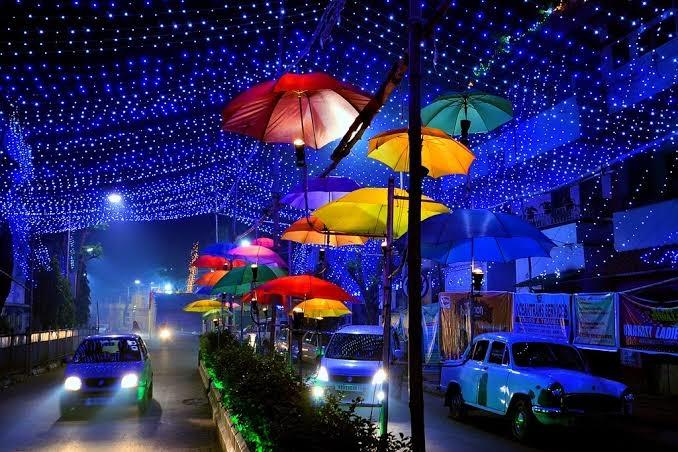A Dim Diwali Impacts Daily Wagers, Small Businesses in Kolkata

Kolkata: D Banerjee, 61, has just closed down his cosmetic dealership in Kolkata. There was a time when his cosmetics business was flourished, but the rough patch since the past couple of years doesn’t seem to end.
Banerjee is not alone, several small businessmen like him in the cosmetics and other such industries are witnessing this trend after a dip in the manufacturing sector growth across the country, whose ripple effect has also hit the services sector. This year, Diwali failed to bring any cheer to them.
Banerjee, who hails from a prominent business family of Kolkata, chose his time to retire and exit the industry rather than take chances in a situation, where hope depends on windfall profits of companies.
“If I was in government service, I would have retired by now. Hence, there’s no rationale to continue the business for which I can only see rough seas ahead,” he told Newsclick.
Many other such businessmen are thinking on the same lines, especially after the twin onslaught of demonetisation and imposition of goods and services tax, which has impacted their profitability.
Daily wagers and services sector workers faced a similar situation this Diwali in Kolkata.
An auto driver who did wish to be named, said: “This Diwali has been the worst earner for all daily wage earners.”
Taking a dig at salaried employees, he said in times of downturn, at least those people gets salaries, even if meagre.
The auto driver, who drives in the Southern Suburbs of Kolkata, recalled that a couple of years ago, the services sector was booming, adding in his experience of the past 27 years, this was the first time that there were so few people on the roads this Diwali, blaming the economic slowdown for this.
It may be recalled that in West Bengal, after the Singur episode (when the Tatas pulled out from setting up an industry in the state after protests led by Trinamool Congress), setting up of manufacturing industries is abysmally low. Even the state government’s plans for growth of new industries are limited to sectors, such as electronics, real and services, which depend heavily on a ‘feel good’ GDP.
As per latest Reserve Bank of India trends, the country’s gross domestic product growth (GDP) growth – a marker of the economy’s health -- has fallen to 5%. In such as situation, West Bengal’s economy has also taken a hit, with its burgeoning real estate sector sales dipping to a low.
As per a report in The New Indian Express, “the overall slowdown in the economy, coupled with factors like the NBFC (Non Banking Financial Company) crisis, developer defaults and bankruptcies, have slackened the sentiments of the sector, especially for the residential segment. The situation is further compounded by factors like the ongoing liquidity crisis and a diminutive demand scenario” according to global real estate consultants, Knight Frank.
With the retail sector struggling to keep up with direct competition from direct marketing initiatives by eCommerce giants, the of supply chain in the garments manufacturing sector has been impacted, leading to job losses.
The RBI’s projection of 5% GDP growth is the lowest in nearly a decade, but all that the corporate friendly Bharatiya Janata Party government at the Centre is doing is hiding its economic failures by harping on its hyper-nationalist agenda.
However, the people have started seeing through the Narendra Modi government’s attempt to cover up the pathetic state of Indian economy with its “Hindu jingoistic rhetoric”, according to Sitaram Yechury, general secretary of the Communist Party of India (Marxist), which could be gauged from the currently concluded Assembly elections in Maharashtra and Haryana, where the ruling BJP won but did not do too well.
At this juncture, it remains to be seen whether the Modi government will tone down it hyper-nationalist rhetoric or pursue a harder Hindutva agenda.
Commenting on the situation, CPI(M) polit bureau member and former parliamentarian, Mohd Salim, defined the growing unrest in many parts of the country “as a mix of socio-political economic upheaval”, whereby the sluggish economy had robbed the happiness from people’s lives. The direct impact of this is being felt in festivities, such as Diwali, which are predominantly about sharing happiness amongst families and peers.
Sharing his recent experience, Salim described a scene that he witnessed in Alipurduar in North Bengal. Acres after acres of land under the tea industry is lying barren, as tea garden managers have fled the factories and gardens, in order to avoid giving accruals to workers.
“Where are the Central and state governments now?” he said.
A lacklustre and mismanaged economy, combined with the communally motivated National Register of Citizens being pushed by the BJP government, has blurred the feeling of festivity, too, Salim added.
Get the latest reports & analysis with people's perspective on Protests, movements & deep analytical videos, discussions of the current affairs in your Telegram app. Subscribe to NewsClick's Telegram channel & get Real-Time updates on stories, as they get published on our website.























